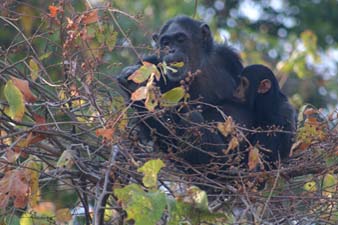Infancy and Childhood

Credit- Eric Matthews
Chimpanzee infants are
born after 8 months of gestation. At birth they weigh less
than 3 lbs. and like human infants, they are extremely
fragile and helpless. During the first months of life
infants are completely dependent on their mothers for food
and care. A newborn infant nurses for 3 minutes nearly
every hour. At night the infant is kept warm and safe in
its mother's arms high in the trees in her sleeping nest.
At 6 months-of-age, the infant moves clumsily and stumbles
about on the ground but climbs about more securely in the
branches of low trees. Chimpanzee infants continue to
breast feed for the first four or five years of life. They
are even more dependent on their mothers for comfort and
food than human infants.
Childhood begins at five
years-of-age and lasts until the juvenile chimpanzee is
seven years old or becomes sexually matured. During this
time, the young chimpanzee remains close to its mother but
spends increasing larger amounts of time away from her
with members of its own age group. It has learned to build
its own sleeping nest and no longer depends on her for
nourishment and transportation. Females give birth to one
infant about every five years. Two out of five infants
will survive to adulthood.
Captive Chimpanzees
.jpg)
Credit- Patrick van Veen
Zoo chimpanzees mature
faster than wild ones. Although it is not common, female
chimpanzees have given birth and male chimpanzees have
fathered infants at six years-of-age. Maturity also
appears to be occurring at a younger age. There are nearly
forty chimpanzees of 34 years or older in American zoos.
Several have lived into the fifth decade and at least one
male and one female are now in their sixties. Modern
keepers not only look after the chimpanzees' needs but
also monitor their health and psychological well-being.
The life span of pet chimpanzees is not known.


.jpg)